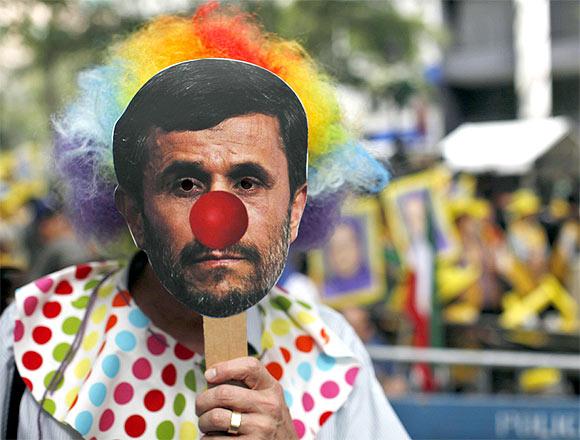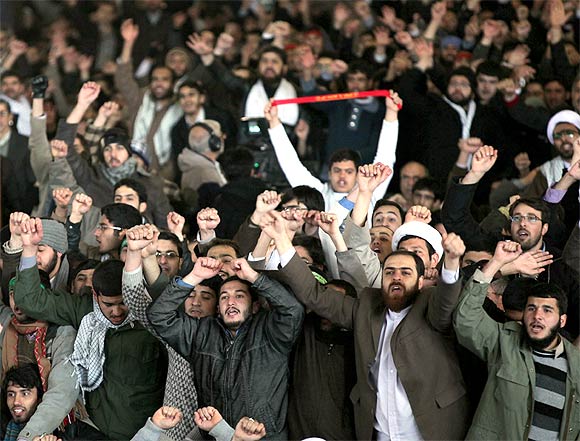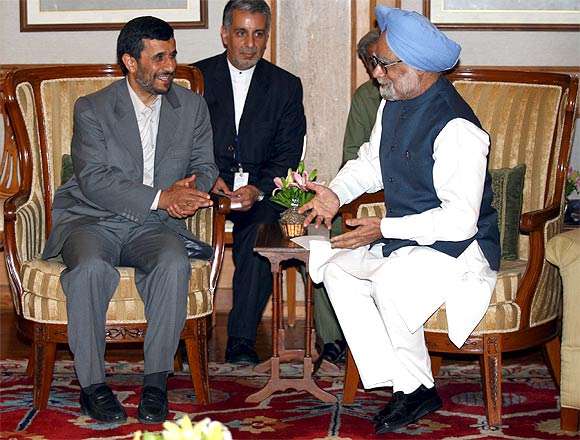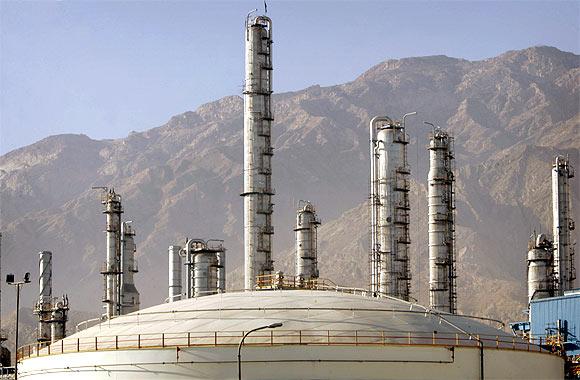
Foreign Secretary Ranjan Mathai, who is visiting Washington, DC, has cautioned that India is unlikely to go along with tough sanctions against Iran even as the paranoia over that country's alleged nuclear weapons programme reaches fever-pitch. He also warned that any military action in the Gulf would plunge that region into grave instability and chaos.
Incidentally, Mathai is scheduled to meet senior Obama administration officials, including those in the White House National Security Council, and US lawmakers on Capitol Hill.
In remarks at the Centre for Strategic and International Studies, Mathai said, "Let me start with the developments in West Asia in 2011 which may have taken us all by surprise."
"We were all trying to comprehend the underlying causes and the forces involved, and striving to grasp the consequences and sense the outcomes of changes that generated both hope and concerns in a region of global significance," he said.
Reportage: Aziz Haniffa in Washington, DC
Click on NEXT for more...
For Rediff Realtime News on Iran, click here

Mathai pointed out, "Six million Indians live in that region; they constitute the largest expatriate group and obviously their welfare is a matter of high priority. The region is critical for our economy, contributing over a $100 billion by way of export markets, over $40 billion in remittances and more than two-third of our petroleum imports; this in a country dependent on imports for 75 percent of its oil consumption."
He argued, "Peace and stability and a climate of moderation in the region are absolutely vital for India."
Mathai noted, "We not only have strong political and economic ties with countries in the region, but also enjoy a warm relationship with their people. Since before the time when India became one of the earliest destinations for the three great religions from West Asia, India and the West Asian countries have shared close and natural ties as neighbours."
"Ties of religion continue to bind us. India has always had and will remain sensitive to the interests, aspirations and rights of the people in West Asia. And we do expect that their governments, too, will respect their rights and respond to their aspirations. We are all united by the desire for peace and stability in the region and we must seek to forge the broadest possible consensus on our collective response," he said.
He acknowledged that by the same token "it also follows from our stakes in the region that we do not wish to see the spread of nuclear weapons in West Asia. India's position on the question of Iran's nuclear programme is well known and our votes in IAEA speak for themselves."
Click on NEXT for more...
For Rediff Realtime News on Iran, click here

"We believe that while Iran has rights to peaceful uses of nuclear energy, it must also fulfill its international obligations as a non-nuclear weapon state under the NPT (Nuclear non-proliferation treaty). We would like to see the issue resolved peacefully through negotiations. We also hope that negotiations between P5+1 (United States, United Kingdom, France, Germany, Russia and China) and Iran would resume soon and contribute to a positive outcome," Mathai said.
Mathai explained, "Iran is our near neighbour, our only surface access to Central Asia and Afghanistan, and constitutes a declining but still a significant share -- currently under 10 percent -- of our oil imports."
Thus, he reiterated that "for us, there are also broader and long term geo-strategic concerns that are no different from what we face elsewhere in the Asia-Pacific region. Our relationship with Iran is neither inconsistent with our non-proliferation objectives, nor is it in contradiction with the relationships that we have with our friends in West Asia or with the United States and Europe."
Earlier, State Department spokesman Mark Toner had said that discussion of sanctions against Iran and the implications for Washington's strategic partners like India were expected during Mathai's visit.
Click on NEXT for more...
For Rediff Realtime News on Iran, click here

But even if the administration may not attempt to prevail on India to go along, sources have said that the frenzy against Iran on Capitol Hill, particularly among the massive pro-Israeli lobby, was crystallizing to such an extent that even India's friends in Congress would be more than peeved with New Delhi if it doesn't go along with the punitive action against Teheran and the US-led efforts to isolate that country.
Even though the administration has already imposed some of the toughest and most punitive sanctions against Iran, some US lawmakers like Congresswoman Ileana Ros-Lehtinen, Florida Republican and chair of the House Foreign Affairs Committee, whom Mathai is scheduled to meet with, has said these sanctions don't go far enough.
In the wake of Monday's sanctions against the Central Bank of Iran announced by the Obama administration, Ros-Lehtinen said, "The implementation of the first phase of sanctions against the Central Bank of Iran is a step in the right direction, but the administration's Iran sanctions policy needs to get much tougher, and fast."
She said, "The administration must immediately impose sanctions against foreign financial institutions doing business with Iran, against all companies investing in Iran's energy sector, and against all entities supplying Iran with refined petroleum products."
Ros-Lehtnien argued that "only by taking this vigorous course of action can we finally apply the crippling pressure necessary to force Iran to abandon its nuclear programme and support for extremists."
Click on NEXT for more...
For Rediff Realtime News on Iran, click here